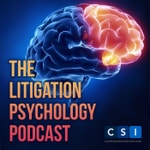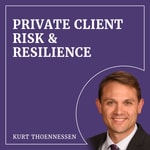The Litigation Psychology Podcast – Détails, épisodes et analyse
Détails du podcast
Informations techniques et générales issues du flux RSS du podcast.

The Litigation Psychology Podcast
litpsych
Fréquence : 1 épisode/7j. Total Éps: 273

Classements récents
Dernières positions dans les classements Apple Podcasts et Spotify.
Apple Podcasts
🇺🇸 États-Unis - socialSciences
13/08/2025#54🇺🇸 États-Unis - socialSciences
12/08/2025#87🇺🇸 États-Unis - socialSciences
11/08/2025#61🇺🇸 États-Unis - socialSciences
10/08/2025#44🇺🇸 États-Unis - socialSciences
09/08/2025#63🇨🇦 Canada - socialSciences
08/08/2025#96🇺🇸 États-Unis - socialSciences
08/08/2025#62🇨🇦 Canada - socialSciences
07/08/2025#83🇺🇸 États-Unis - socialSciences
07/08/2025#57🇨🇦 Canada - socialSciences
06/08/2025#64
Spotify
Aucun classement récent disponible
Liens partagés entre épisodes et podcasts
Liens présents dans les descriptions d'épisodes et autres podcasts les utilisant également.
See allQualité et score du flux RSS
Évaluation technique de la qualité et de la structure du flux RSS.
See allScore global : 37%
Historique des publications
Répartition mensuelle des publications d'épisodes au fil des années.
The Litigation Psychology Podcast - Episode 227 - Talking About Memory with Dr. Elizabeth Loftus - Part 2
Épisode 229
lundi 26 août 2024 • Durée 20:14
Nationally recognized and renowned memory expert Dr. Elizabeth Loftus joins Steve Wood, Ph.D. for the second part of their discussion about memory, where they talk about repressed memories. Dr. Loftus shares her experience working on cases where repressed memories were at the core of the case and the research she has done on repressed memories and false memories. Steve and Elizabeth discuss the ways in which she has been challenged and attacked for her research and the work she has done around repressed memories. Lastly, they talk about how Dr. Loftus acts as an investigator on the cases she works on.
The Litigation Psychology Podcast - Episode 226 - Listener Mail
Épisode 228
lundi 19 août 2024 • Durée 36:52
Bill Kanasky, Jr., Ph.D. answers another round of podcast listener mail:
- What is the best timing for witness training? - What is the best routine for the witness the morning of the deposition? - How do you deal with catastrophic injury and death cases every week? - How long should focus groups be? - Any updates on nuclear verdicts and how to prevent them?
Watch the video of this episode: https://www.courtroomsciences.com/r/yn6
The Litigation Psychology Podcast - Episode 217 - Cross-Examining Expert Witnesses
Épisode 219
lundi 3 juin 2024 • Durée 42:14
Holly Howanitz, Managing Partner, Tyson & Mendes joins Bill Kanasky, Jr., Ph.D. to talk about cross-examination of expert witnesses. Holly highlights that you need think about your goals when cross-examining expert witnesses especially since experts often have more experience testifying than a fact witness. Bill and Holly talk about strategic decisions such as when to bring up "bombs" for the expert either at deposition or at trial and how to approach preparing for cross-examining an expert. Holly shares how she prepares for an arrogant expert or an expert that does primarily work for the plaintiff's side. Bill and Holly also talk about preparing experts for the defense and what that process is like. Watch the video of this episode: https://www.courtroomsciences.com/r/fO6
The Litigation Psychology Podcast - Episode 127 - Law Enforcement and Healthcare Witness Preparation
Épisode 129
lundi 1 août 2022 • Durée 40:40
Joe Longfellow, Partner & Trial Attorney with Andrew, Crabtree, Knox & Longfellow, joins the podcast to talk about his work on civil rights defense cases primarily defending law enforcement officers, and also working with healthcare witnesses in med mal cases. Joe describes the challenges of witness prep of law enforcement and how he works with these often difficult witnesses. He also shares his approach to helping jurors understand the difference between negligence and deliberate indifference. Bill and Joe share their thoughts on preparing witnesses, the role that prior testimony plays in new litigation and how to prepare and handle, the goal of a witness at deposition, and more. Watch the video of this episode: https://www.courtroomsciences.com/r/QHO
The Litigation Psychology Podcast - Episode 126 - Answering with ”It depends” During Testimony
Épisode 128
lundi 25 juillet 2022 • Durée 40:23
Baxter Drennon, Partner with Hall Booth Smith, joins the podcast to talk about responses to Reptile Theory questions, in particular the answer of "It depends." This response can make some defense attorneys uncomfortable. Steve, Bill, and Baxter discuss the circumstances in which "It depends" is the truthful and most accurate response. They talk about the validity and comfort of a witness varying their responses and what cognitive factors are involved in the way a question is responded to. Baxter shares the approach he takes with his witnesses and the importance of identifying the purpose of the deposition as a way to manage responses. The group talk about the dangers and risks of a witness pivoting when responding to opposing counsel questions, as well as, the opportunity and considerations with a follow-up question to an "It depends" response. Lastly, Steve, Bill, and Baxter discuss the necessity of educating witnesses on the strategy of the case, for them to understand the roles of the witness and the attorney, and what jurors respond to, positively and negatively, when hearing witness testimony. Watch the video of this episode: https://www.courtroomsciences.com/r/hLQ
The Litigation Psychology Podcast - Episode 125 - 13 Cognitive Distortions Crippling Your Witness - Part 1
Épisode 127
lundi 18 juillet 2022 • Durée 30:57
In the first of a multi-part topic, Dr. Steve Wood and Dr. Bill Kanasky, Jr. discuss irrational thinking patterns. Steve and Bill describe how the brain makes connections that may or may not be connected in reality and how that type of irrational thinking can impact witness performance, requiring cognitive reframing to correct these irrational thinking patterns. Bill and Steve have identified 13 cognitive distortions that are crippling your witnesses and cover four of these distortions in this episode:
1) Polarized thinking - this type of thinking occurs when your witness feels they have to be perfect as a witness;
2) Mental filtering - when a witness magnifies negative aspects of the case and ignores or discounts positive facts;
3) Overgeneralization - this happens when your witness focuses on a single negative event from the past and makes an extreme conclusion that all other events in the future will be negative;
4) Jumping to conclusions - your witness is convinced that there is no chance at obtaining a favorable trial verdict or settlement.
Watch the video of this episode: https://www.courtroomsciences.com/r/ImG
The Litigation Psychology Podcast - Episode 124 - Reptile, Witnesses and Anchoring
Épisode 126
lundi 11 juillet 2022 • Durée 34:45
Nick Rauch, Attorney with Larson King in Minnesota, joins the podcast to talk about defending against the plaintiff Reptile Theory, particularly by starting defense preparation very early in the case. Nick and Bill discuss where and how early they are seeing Reptile in the litigation process, plus the importance and implications of a corporate representative's deposition testimony and having them prepared for potential Reptile attacks and traps. Nick also shares his perspectives on anchoring and counter-anchoring, how these concepts can start in the initial communications about the case, and making sure you are discussing the strategy for anchoring and counter-anchoring with clients so everyone is in alignment. Bill and Nick also discuss how to talk to witnesses about their role in testimony, how they fit within the broader strategy of the case, and the critical importance of likeability in testimony. Watch the video this episode: https://www.courtroomsciences.com/r/KdZ
The Litigation Psychology Podcast - Episode 123 - Johnny Depp v. Amber Heard Trial
Épisode 125
lundi 20 juin 2022 • Durée 40:57
Dr. Steve Wood is joined by CSI Crisis Communications Practice Leader Sean Murphy to discuss the Johnny Depp v. Amber Heard trial. Sean describes how public opinion was being influenced daily during the trial and the narrative that was being communicated in the court of public opinion. Sean shares the approach that should be taken in litigation communications and what seemed to work for Johnny Depp's side and worked against Amber Heard's side during this trial. Steve talks about some elements of Reptile Theory that seemed apparent in closing arguments and they also share their assessment of how Johnny and Amber performed as witnesses, how they responded to questioning and cross-examination, and how they engaged with the jury. They conclude by noting how, although this is celebrity defamation case, its a good case to study to understand how to define and control the narrative of any trial. To watch the video of this episode: https://www.courtroomsciences.com/r/cCK
The Litigation Psychology Podcast - Episode 122 - Summer Break and A Look Ahead
Épisode 124
lundi 30 mai 2022 • Durée 03:41
Dr. Steve Wood gives an update on The Litigation Psychology Podcast schedule for the summer and a preview of some of the topics that will be featured in new episodes when the podcast returns from a short summer break. Those topics include the Johnny Depp and Amber Heard trial, preparing a former employee for deposition, the fallacy of the reptile brain, social influence in the courtroom, top excuses we hear for not conducting jury research, how to prepare emotional witnesses for testimony, plus many more. To watch the video of this episode: https://www.courtroomsciences.com/r/OzS
The Litigation Psychology Podcast - Episode 121 - The White Hat Movement for the Trucking Industry
Épisode 123
lundi 23 mai 2022 • Durée 23:10
Doug Marcello, Chief Legal Officer with Bluewire, joins the podcast to talk about the genesis of Bluewire and the benefits for trucking and transportation companies. Bluewire software analyzes vulnerabilities for motor carriers and provides recommendations to reduce or eliminate those vulnerabilities. It allows for a strategic, proactive response to help trucking companies avoid nuclear verdicts. Doug also talks about Bluewire Connect which is an online community limited to trucking industry individuals, trucking defense attorneys, and trucking insurance representatives. The Bluewire Connect forum allows for a free and active exchange of ideas and information between members, as well as helping them find information on resources, experts, vendors, etc. that can be of benefit to their business. Lastly, Doug and Bill discuss some of the primary sources of vulnerabilities for trucking companies, plus some of the less obvious vulnerabilities, and the importance of motor carriers having a formal crisis response plan. Watch the video of this episode: https://www.courtroomsciences.com/r/oTb
